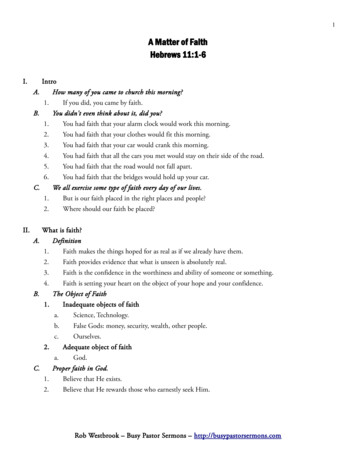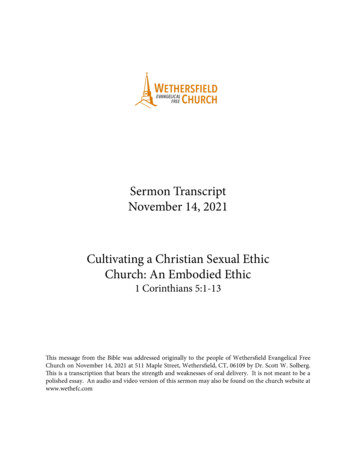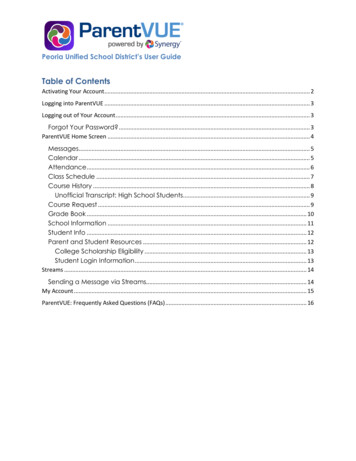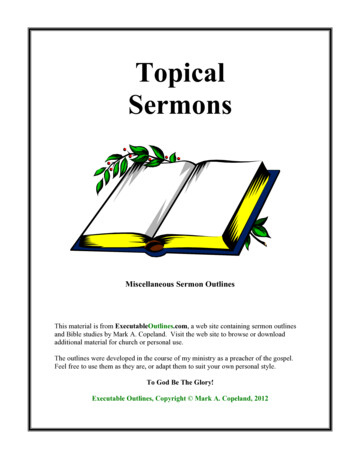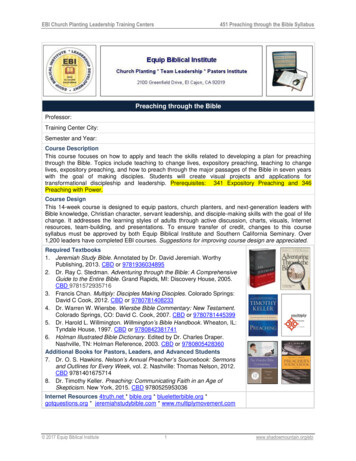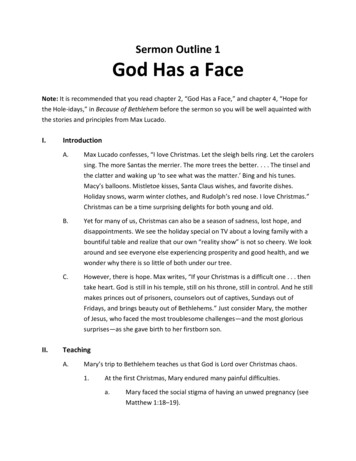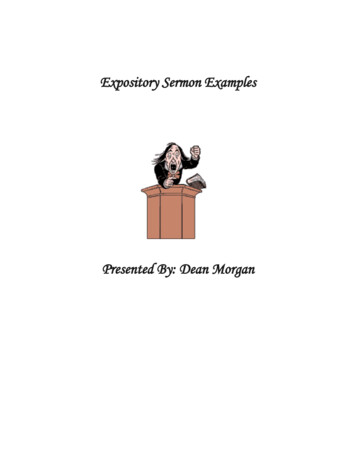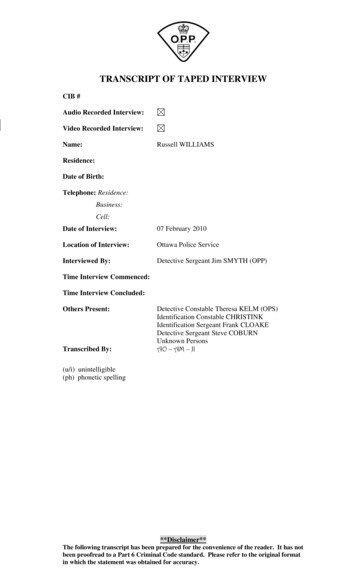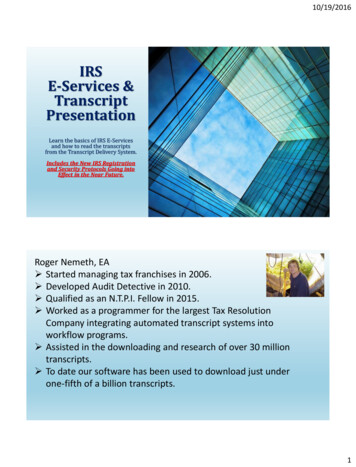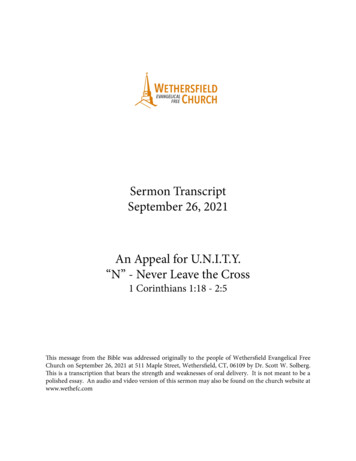
Transcription
Sermon TranscriptSeptember 26, 2021An Appeal for U.N.I.T.Y.“N” - Never Leave the Cross1 Corinthians 1:18 - 2:5This message from the Bible was addressed originally to the people of Wethersfield Evangelical FreeChurch on September 26, 2021 at 511 Maple Street, Wethersfield, CT, 06109 by Dr. Scott W. Solberg.This is a transcription that bears the strength and weaknesses of oral delivery. It is not meant to be apolished essay. An audio and video version of this sermon may also be found on the church website atwww.wethefc.com1
Sermon Text1 Corinthians 1:18 - 2:51:18 For the word of the cross is folly to those who are perishing, but to us who arebeing saved it is the power of God.19 For it is written,I will destroy the wisdom of the wise,and the discernment of the discerning I will thwart.20 Where is the one who is wise? Where is the scribe? Where is the debater of this age?Has not God made foolish the wisdom of the world? 21 For since, in the wisdom of God,the world did not know God through wisdom, it pleased God through the folly of whatwe preach to save those who believe. 22 For Jews demand signs and Greeks seekwisdom, 23 but we preach Christ crucified, a stumbling block to Jews and folly toGentiles, 24 but to those who are called, both Jews and Greeks, Christ the power of Godand the wisdom of God. 25 For the foolishness of God is wiser than men, and theweakness of God is stronger than men.26 For consider your calling, brothers: not many of you were wise according to worldlystandards, not many were powerful, not many were of noble birth. 27 But God chosewhat is foolish in the world to shame the wise; God chose what is weak in the world toshame the strong; 28 God chose what is low and despised in the world, even things thatare not, to bring to nothing things that are, 29 so that no human being might boast inthe presence of God. 30 And because of him you are in Christ Jesus, who became to uswisdom from God, righteousness and sanctification and redemption, 31 so that, as it iswritten, Let the one who boasts, boast in the Lord.2:1 And I, when I came to you, brothers, did not come proclaiming to you thetestimony of God with lofty speech or wisdom. 2 For I decided to know nothing amongyou except Jesus Christ and him crucified. 3 And I was with you in weakness and in fearand much trembling, 4 and my speech and my message were not in plausible words ofwisdom, but in demonstration of the Spirit and of power, 5 that your faith might not restin the wisdom of men but in the power of God.2
IntroductionIf I were to ask you to identify the symbol that best represents Christianity, I thinkmost of you would readily point to the symbol hanging behind me this morning. Youwould point to the cross. The cross is the symbol of our Christian faith. While that haslong been the case, from as early as the second century, it wasn’t the earliest symbol forthe Christian faith. In the catacombs, the underground burial places where persecutedChristians would often hide for safety, other symbols were etched into the walls tocovertly identify themselves to each other. Perhaps the most familiar of these covertsymbols to us would be the fish, often found now on the back of cars, most likelyidentifying the driver as someone who espouses faith in Jesus. The word for fish inGreek, ichthys, was an acronym for Jesus: Iesus Christos Theou Huios Soter—“JesusChrist, Son of God, Savior.”It didn’t take long, though, for every other symbol for Christianity to take a back seat tothe symbol of the cross. But I wonder, as 2000 years of church history has past, if theimpact of this sacred symbol of our faith has been somewhat lost to us. We look at thiscross hanging behind me and it is carefully crafted, artfully appealing, smooth to thetouch—it is not a very “old rugged cross.” And that is just it, isn’t it? What hasbecome somewhat sanitized was once considered a symbol of horror. John Stott said,“The Christian’s choice of a cross as the symbol of their faith is more surprising whenwe remember the horror with which crucifixion was regarded in the ancient world.”1The cross was a form of execution. It was invented by the “barbarians” and theRomans perfected it. It was an execution reserved only for the criminal convicted ofmurder, rebellion or armed robbery—provided that they were a slave, a foreigner, or . . a nobody. It was so heinous a death, no Roman citizen, except in extreme cases oftreason, could be put to death by execution on a cross. Writing a generation prior tothe time of Christ, the Roman historian Cicero said of crucifixion, “There is no fittingword that can possibly describe so horrible a death.”2 And yet, this symbol of death isthe symbol of our faith . . . a symbol of execution, a cross. Could you imaginefollowing a religion that had a noose used for lynching as it’s symbol? Or imagine areligion that adopted a symbol associated with torture to represent their faith . . . It ishard to come up with a contemporary equivalent to the cross. But as we wince at sucha notion, perhaps we can have some understanding as to why Paul says in verse 23 ofour passage, that the cross was a stumbling block to the Jews and folly to the Gentiles.And yet, Paul reminds us this morning that the cross is the symbol of our faith because3
the cross occupies the center of our faith. He opens our passage by saying in verse 18,“For the word of the cross is folly to those who are perishing, but to us who are beingsaved it is the power of God.” He adds in verse 23 that “we preach Christ crucified”and he testifies in 1 Corinthians 2:2, “For I decided to know nothing among youexcept Jesus Christ and him crucified.” The cross is at the center of Paul’s messageand it is not just a message for the beginning of your faith journey. The cross formsand shapes the life of the follower of Jesus and the life of the church. We live out ourfaith as saints together, the church, one body, under the shadow of the cross.Gordon Fee said that this was part of the problem with those causing disunity in thechurch. They felt some of the “humiliation” associated with the horror of the crossand so they sought to “move on” to “higher” things than the cross; wisdom, theycalled it. And Paul’s message to them is simply this: “to move beyond the cross is notto ‘move on’ at all, but it is to abandon Christ altogether.”3 So perhaps as the symbolof the cross has become a somewhat sanitized version of what the cross reallyresembled in the first century, perhaps we have also lost sight of what it means to keepthe cross front and center to our faith and what it means to be formed and shaped bythe cross as we live out our lives as saints together in the church, the body of Christ.As we continue working our way through 1 Corinthians 1-4 we are looking at whatPaul has to say about unity in the church. He had received a report from Chloe’speople that they were divided and they were quarreling with each other. And so hesays to them “I appeal to you, brothers, by the name of our Lord Jesus Christ . . . beunited.” In making his appeal for unity in the first four chapters of 1 Corinthians,Paul gives us five methods to help us live in unity with one another. We are using theacronym U.N.I.T.Y. to spell out these five methods to living out our unity.Last week we saw the first method to maintaining our unity, beginning with the letter“U”. “U” stands for Unceasing Gratitude. As we give thanks for the church—apeople belonging to God, gifted by God and sustained by God—our hearts are drawnto each other. This morning we look at the second method that helps foster our unity.The letter “N” stands for “Never Leave the Cross.” This morning I want you to seehow the word of the cross and the way of the cross shapes our unity.The Word of the CrossPaul refers to the word of the cross in verse 18. What is the word of the cross? Oranother way to say it, “what is the message of the cross?” And how does this message4
of the cross speak to the issue of division in the church? What message or what word dowe get from the cross that addresses the problem of division in the church?If you recall, Paul characterized the division of the church in Corinth as revolvingaround personalities and competing factions. He described it this way in verse 12,“What I mean is that each of you says, ‘I follow Paul’ or ‘I follow Apollos,’ or ‘I followCephas,’ or ‘I follow Christ.’” I mentioned a couple weeks ago that we are not really surewhat was behind their division and how tightly formed these factions actually were. Buthere is what we do know, which is common when division rears it’s head in any church.The prominent and repeated word in describing the division in the church at Corinth isthe word “I”. “I follow Paul,” “I” . . . “I” . . . “I.” They were exalting themselves and their“wisdom” over some of their renowned teachers. It is pride. It is boasting.St. Augustine divided people into one of two camps. He called them “cities.” You eitherlive in the “city of man” or the “city of God.” What is the difference between the two?One main difference is found in what you love. He said, “Worldly society has floweredfrom a selfish love which dared to despise even God, whereas the communion of saints isrooted in a love of God that is ready to trample on self . . . One lifts up its head in its ownboasting; the other says to God: ‘Thou art my glory.’”4 Or Tim Keller puts these twooptions this way. We are either governed by self-sacrifice or we are governed by selfassertion. One finds himself through self-giving to something outside of himself and theother through self-expression of something inside himself.5 It is my contention—andperhaps my testimony—that it is not natural for me to be “ready to trample on self” andit is not natural for me to live a life of “self-sacrifice.” I may belong to the “city of theGod,” but the “city of man” can easily rear its influence in my life. As a church, we mayrepresent the “city of God” but the “city of man” can have its destructive way among us.What do we have to empower us to “be ready to trample on self”? What do we have atour disposal that can take our natural bent towards self-assertion and move us to selfsacrifice? What do we have that will take us from exalting in ourselves to doing whatPaul says we should do at the end of 1 Corinthians - “Let the one who boasts, boast inthe Lord.” Do you know what we have? We have the word of the cross. CraigBlomberg says that the word of the cross “provides the necessary antidote (vaccine) tothe self-centered factions of the Corinthians.”6 Paul said that the word of the cross is thepower of God for those who are being saved. We don’t graduate from the cross. Wedon’t move on from the cross. Instead, the word of the cross casts its shadow over us.What is the word of the cross? What is the message that comes from the cross? The5
answer to that question could be multiple sermons. But for the sake of this sermon, theword of the cross is the word “humility.” I think of what Paul said of the cross inPhilippians 2. Speaking of Jesus, the divine Son of God, “though he was in the form ofGod, did not count equality with God a thing to be grasped, but made himself nothing,taking the form of a servant, being born in the likeness of men. And being found inhuman form, he humbled himself . . . he humbled himself.” How? “By becomingobedient to the point of death, even death on the cross.” There it is, the cross! And whydoes Paul tells us this? So that we would be of the same mind . . . So that we would looknot only to our own interests but to the interests of others.” The word of the cross is aword of humility that casts a shadow over our lives and forms a certain humility in us.Blomberg said of this church in Corinth that they “needed to embrace more of thehumility of the cross.”7 We can never go wrong with that. Never leave the cross.And yet, it is easy for us to want more than the cross. It is easy for us to be attracted toother things, to feel the need to move on to “higher” and more “lofty” things than thecross. Paul said that the Jews found the cross to be a stumbling block because they werelooking for signs . . . miracles that proved Jesus was the Son of God. John, in the Gospelof John, referred to the miracles of Jesus as signs. Lets face it, miracles sound moreappealing, exciting and perhaps more confirming to us that God is present and active.And yet, one has to wonder how many “signs” did Jesus have to perform for people tobelieve? Just to name a few miracles; He walked on water . . . He gave sight to the blind . . He cast out demons . . . He raised the dead. He did all of this in public. And yet thepeople who saw this public display of the power of Jesus were the very ones who cried“Crucify him!” In fact, when the Jews ask Jesus for a sign to demonstrate that he isindeed the promised Messiah, he said that the only sign that will be given them is thesign of Jonah. “For just as Jonah was three days and three nights in the belly of the greatfish, so will the Son of Man be three days and three nights in the heart of the earth.” Inother words, the sign that has the power to save is the cross.To Jewish ears, this was a stumbling block. The origin of this word stumbling blockcomes out of Leviticus 19 where the law warned against putting an obstacle in front of ablind person that would cause the person to trip. The Jews tripped over the crossbecause they could not see, they could not fathom, God’s Messiah dying on a cross. TheOld Testament law said this about those who hung from a tree, “anyone who is hung ona tree is under God’s curse.” The Jews found it incredulous to think that their Messiahwould suffer such a death and come under this kind of curse. And yet, that is exactlywhat happened. Paul says in Galatians 3, “Christ redeemed us from the curse of thelaw—our guilt for sin—by becoming a curse for us.”6
That is indeed the power of the cross. Christ is the power of God to save. Because hehung on that tree and became a curse for sin, we can be forgiven. I heard the story thisweek of an Iranian student, a devout Muslim. He faithfully read his Qu’ran, said hisprayers five times a day and sought to lead a good life. A religious man, he was. But nomatter how hard he strived to do these things, his sin haunted him. Some Christianfriends brought him to church, encouraged him to read his Bible and he learned aboutthe cross, how Jesus died on the cross for his sins. He said this, “For me the offer wasirresistible and heaven-sent,” and he cried to God to have mercy on him throughChrist. Almost immediately, he said, “the burden of my past life was lifted. I felt as if ahuge weight had gone. With the relief and sense of lightness came incredible joy. Atlast it had happened. I was free of my past. I knew that God had forgiven me, and I feltclean. I wanted to shout and tell everybody.” That is the power of the cross. Thecharacter of God’s love and mercy towards us is clearly displayed at the cross.Paul goes on to say that the Greeks had a problem with the cross as well. They thoughtit was folly. They thought it was folly because it exalted weakness over strength. TheGerman philosopher, Friedrich Nietzsche captured the heart and mind of the repulsionthe Greeks had toward the cross. He wrote in the book The Anti-Christ that good is“the will to power” and that bad is “all that proceeds from weakness.” And so he saidthat the decadence of Christianity is that it takes the side of everything weak whichthwarts the very essence of evolution—the survival of the fittest. And so with greatcontempt he referred to the absurd notion of Christianity, which is God on the cross.He considered Christianity to be “intellectually contemptible and morally outrageous.8Before we point the finger at those outside the church, I don’t think we are too far fromthe Greeks in thinking that the humility of the cross is not enough. Whether it is ourquest for success or our attraction of the celebrity or putting our trust in having accessto power in the halls of Washington D.C. (lets not lose sight of the fact that the word“evangelical” has more to do today with politics than it does with the cross) and so weunwittingly convey that the cross is folly. It is not enough. We sell out to the “wisdom”of this world—to power, to access, to success, to significance and this leads to ourboasting and our pride. That is what destroys our unity.I remember reading a book a long time ago about a journalist who was givenpermission and access to spend a semester living at a Christian college among all theseChristian students. He went into the semester with his preconceived notions aboutChristians, and at the end of the semester he found many of those notions challenged.He grew to like these students and admire them for their way of life. But at the end of7
the book he was asked whether or not it changed his mind about Christianity. In spiteof his appreciation for these students, he stood could not get over the “folly” of the cross.He said that at the end of the day, “Christianity is an ancient slaughter house religion.”He thought it was nothing but a religion out of touch with the wisdom gleaned throughthe ages. It was out of touch with common sense and decency. And yet Paul says,nothing could be further from the truth. Christ and the cross is the very wisdom of God.How so? In Romans 1-11, we have eleven chapters that meticulously unfold the messageof the gospel, the power of God for salvation. Do you now how Paul ends that sectionthat articulates the gospel. “Oh the depth of the riches and wisdom and knowledge ofGod.” What is the wisdom of the cross? It is the place where God justice is satisfied andat the same time, his love and mercy are extended to us. Stott said of the cross is that itis the wisdom of God to “devise such a costly plan that both meets our needs and alsosatisfies God’s character.”9 And so Paul is saying here that man cannot come to knowGod by their own wisdom, there own reasoning. Instead, we come to know God bywhat is revealed to us by God and what is revealed to us at the cross. God’s justice issatisfied through the death of Jesus on the cross. God’s love and mercy is on full displaythrough Christ dying in our place . . . And now we can know God.So what is this “word of the cross?” It is the humility of Christ. It is the power of Christto set us free from our sin. It is the wisdom of Christ—the place where God’s wrath andmercy meet and the place where we come to know God. Never leave the cross. Instead,may the shadow of the cross loom larger over us than it has ever done so before.The Way of the CrossThe rest of the passage sets us up for next week when we look at the letter “I.” “I” standsfor “imitate.” We are to imitate this wisdom that comes from the cross. To lead us inthat direction, Paul illustrates how the pattern of the cross, namely the pattern ofhumility can be illustrated in their life as a church and in his life as an apostle. Lastweek, I was on the men’s retreat but I had to come home early because I had to be hereon Sunday. I missed the last two sessions. And so I asked some of the guys tosummarize for me what the pastor said in the sessions I missed. One of the guyssummarized one of the sessions with one phrase. “The pastor reminded us that “you arenot all that.” That is what Paul says to the Corinthians. “When it comes down to it,“you are not all that.” But then he says the same thing of himself.Do you see the pattern? He said to them starting in verse 26, “not many of you were8
wise according to worldly standards, not many were powerful, not many were of noblebirth. But God chose what is foolish in the world to shame the wise; God chose what isweak in the world to shame the strong; God chose what is low and despised in the world,even things that are not, to bring to nothing things that are, so that no humanbeing might boast in the presence of God. And because of him you are in Christ Jesus,who became to us wisdom from God, righteousness and sanctification andredemption, so that, as it is written, Let the one who boasts, boast in the Lord.” In otherwords, “you are not all that!” But, “Christ is all that!” He is the wisdom from God. Heis our righteousness, our sanctification, our redemption. That is why Paul cries out atthe end of Romans 11, “For from him and through him and to him are all things. Tohim be glory forever. Amen!”Paul said the same thing about himself. Starting in 1 Corinthians 2 he said, “And I,when I came to you, brothers, did not come proclaiming to you the testimony of Godwith lofty speech or wisdom. For I decided to know nothing among you except JesusChrist and him crucified. And I was with you in weakness and in fear and muchtrembling, and my speech and my message were not in plausible words of wisdom, butin demonstration of the Spirit and of power, that your faith might not rest in the wisdomof men but in the power of God.” The power of the Spirit was on display when Paul gotout of the way and pointed them to the cross. Lives were changed.Conclusion“N” - Never leave the cross. This symbol of the humility of Christ . . . the wisdom ofChrist . . . the power of Christ must never lose it’s place among us.What was once a picture of horror—execution, has become to us a “cherished” cross,something to cling to . . . “I will cling to the old rugged cross” the hymns says. What isso attractive about the cross? It allows us to come in our weakness. This is truepersonally. We come to the cross as those in need of forgiveness and we come with cry,“God have mercy on me, a sinner.” It is the power of God that delivers us from our sin.But the same is true for us as a church, as the shadow of the cross looms over us. Weproclaim Jesus in our own human weakness, and the power of the Holy Spirit takes thatand God encounters people and changes their lives. Under the shadow of the cross, wetake a humble posture and we love, we forgive, we serve, we worship, we pray in unity . . and in our weakness we are held together by the cross and our humble church family isused by God for the sake of eternity and for the glory of God.9
John Stott The Cross of Christ: Stott Centennial Edition (Downers Grove: IVP, 2020) 29Accounts given by Josephus in Antiquities 17.10.10 and Jewish War 5.11.13Gordon Fee The First Epistle to the Corinthians (Grand Rapids: Eerdmans, 2014) 714Augustine City of God 14.16 (p. 295)5Tim Keller Making Sense of God (New York: Penguin, 2016) 1206Craig Blomberg 1 Corinthians: The NIV Application Commentary (Grand Rapids: Zondervan,1994) 527Ibid., 558Friedrich Nietzsche The Anti-Christ (1895, reprint, London: Penguin, 1968) 115-1189Stott, 2191210
by Dr. Scott Solberg - All rights reserved11
Sermon Title: “N” Never Leave the CrossSermon Text: 1 Corinthians 1:18-2:5Sermon Date: September 26, 2021Getting To Know Me Questions1. Now that the Fall season is here, what are you looking forward to about this season?2. Which of these emotions are you feeling and why?SadAngryScaredHappyExcitedTenderDiving Into The Word3. Read 1 Corinthians 1:18-25.Why do you think the cross is the central message of our faith?Why do you think people think the cross is “folly”?What does the cross tell us about the wisdom of God and the power of God?4. Read 1 Corinthians 1:26-2:5God chose what is foolish, weak, low and despised . . . Why? To what end?How is this an encouragement to you personally?How is our weakness as a church made strong through the cross?5. How does the “word of the cross” help us choose a life of “self-sacrifice” over a life of“self-assertion?”6. How does the “work of the cross” help us live a life of unity in the church? How doesliving under the shadow of the cross help us to love and serve one another?Taking It Home7. What is one thing you are taking from your study?8. Read Romans 11:33-36 and let it guide your time of prayer.12
Sep 26, 2021 · An audio and video version of this sermon may also be found on the church website at www.wethefc.com . 2 . long been the case, from as early as the second century, it wasn’t the earliest symbol for . except Jesus Christ and h

